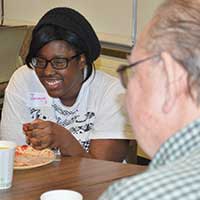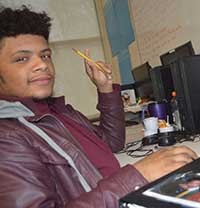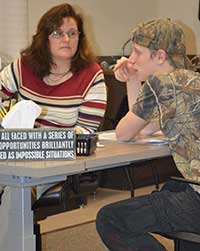The school year has just reached the halfway point, and Nathan Pratt-Harris has seven classes to finish before graduation.
“I’ve been on geometry for two months now, and I need to pick up the pace a little bit,” says the Unity High senior. “Math is my biggest downfall, but since I’ve been here I’ve done way more than I would have at my old schools.”
That’s right; Nathan said schools — with an “s.” He said he left his last school, in another district, because he was bullied. Having been moved from foster home to foster home, he has attended “a lot of different schools.”
| Three Myths About Online High School
It’s a breeze compared with traditional school. “This is not the easiest learning environment,” said student Lon Tower by way of introduction to a class visitor. “Staring at a screen all day can be soul-sucking. You have to motivate yourself. You’ve got to take initiative, and that’s what this teaches you.” Teacher Sue Sweet agreed. “I’ve had parents say ‘My son loves to be on the computer; he’ll do great here,’ and I’ve got to tell them that’s not the same at all.” You can’t take physical education online — that’s just silly. Not so, says Lon. “What it taught me, more than anything, was about making healthy lifestyle choices. I didn’t know what a resting heart rate was before this class, and how it can affect your overall health. In my opinion, (the online class) has a lot more detail.” Besides, he still had to follow a workout routine. “Yes, you can fake that stuff, but that’s defeating the purpose of actually learning the material,” he said. It’s just staring at a screen all day long. Well, yes and no. At Unity, students get frequent breaks and the day is punctuated with group activities from time to time, such as silent reading followed by a discussion of current events. The group also has spent time with residents of Lowell Senior Neighbors, gets regular friendly visits from the district’s community police officer, Todd Summerhays, and from someone from Gilda’s Club who talks with them about grief and emotional support. Also, a group of men from Impact Church visit once a month to make and share breakfast with students. Plus, chair races in the hallway before the holidays were big fun, student Nathan Pratt-Harris said. |
“It was tough to learn, to concentrate on learning,” Nathan said. “Sometimes I don’t try hard enough, but also jumping from home to home got me down, and that made it hard to keep my grades up.”
At Unity, the district’s alternative high school, Nathan said he feels like he’s found the right mix of learning and support.
“Here, you work at your own pace; you get it done however fast or slow you need to,” he said. “Unity is awesome. You feel like family. You feel loved.”
Several seats down, Mikayla Brooks bounces on a stability ball and uses colored pens according to some code known only to her to take English notes. Beside her, Lon Tower is reading a unit on oceans as part of an environmental science class.
‘Unity is awesome. You feel like family. You feel loved.’ — Nathan Pratt-Harris, student
Lon calls himself “the apex of the Apex,” referring to the digital curriculum the district uses. He has been at Unity since near the end of his freshman year, so the senior is also the senior member of the class.
At his previous high school, “the trickiest element for me was being able to conform to the natural flow of how high school is supposed to be,” Lon said.
“I felt anxious and isolated because I didn’t go along with social conventions. Here you’re given your own piece of the pie and it’s all up to you, it’s make or break,” he said. “I very, very much appreciate this program.”
Online but Still in Class
Cary Stamas is principal at MySchool@Kent, a Kent ISD program that serves high schools in Kent County. MySchool is known as a blended school, in that it includes online courses that can be done on students’ own, but has a two-day-a-week attendance requirement.
Stamas said different programs throughout the state have different levels of attendance requirements, up to students having to be there only for testing. He says research shows that online schools that have some in-person requirements do better.
“Because there’s still a face-to-face component and you’re still interacting with other students (and) the teacher, there is that personal touch,” Stamas said. “Without a face-to-face component, online doesn’t do as well as traditional brick and mortar.”
At Unity, nearly 100 percent of students’ lessons take place online, but they are required to be in school five days a week. The school for students in grades 9-12 has been around since 1994, but became an online school in 2010.
Like traditional public schools, online schools must meet Michigan Merit Curriculum and Common Core State Standards. At Unity, graduation requires completion of 21 credits, versus 27 credits at Lowell High School. The difference is in required electives, said lead teacher Sue Sweet.
Sweet likes that the system Lowell uses includes online and written assessments in the form of essays and reports.
“I want them to be able to develop the answer in their heads, then communicate it,” she said. “That’s a challenge, but it’s good for them to do because they are going to use that forever.”

Keeping Teacher Busy
Twenty students on average occupy desks that line the perimeter of one classroom of the program, inside the Runciman administration building, where the district’s main office is located. At the head of the class, Sweet sits across from nearly every student at least once a day, giving one-on-one help in chemistry, then English, then algebra, then government, then geometry.
She is rarely alone at her desk. “It’s a whirlwind,” she says.
Superintendent Greg Pratt said declining enrollment at Unity has seen the number of students drop from as many as 90 to its present 20. He attributes the trend to improved efforts to keep students in the main high school, as well as the school no longer accepting out-of-district students.

That Unity students are of varying grade levels and lack credits in varied subjects also contributed to switching to the online model, Pratt said.
He said Unity graduates just under 60 percent of its students.
Sweet says she understands that some parents and students might have reservations about online-only learning.
“I think we can all agree this is not the ideal learning format,” she said. “There are some real challenges, like the instant feedback you get from interacting in a group all day, and the hands-on piece.

“But there are some big plusses too,” Sweet added. “When you miss a day, you don’t have to have someone else go back to get you caught up. You just pick back up where you were.”
Despite Unity’s online focus, the opportunity students have for one-on-one help is a key component, and “the biggest reason I love teaching here,” Sweet said.
“I get that students want the power of being able to get through courses on their own. They want that independence. But the vast majority of them get stuck. They need a routine. They need someone who’s around all the time and available to give that assistance and to hold them accountable.”









